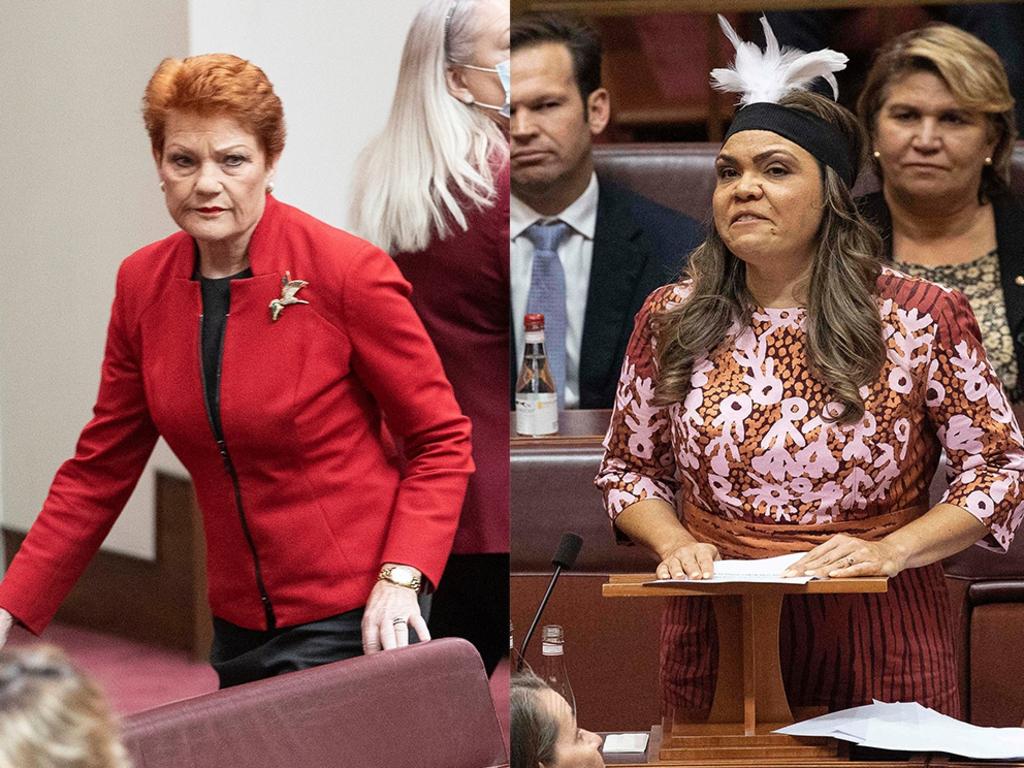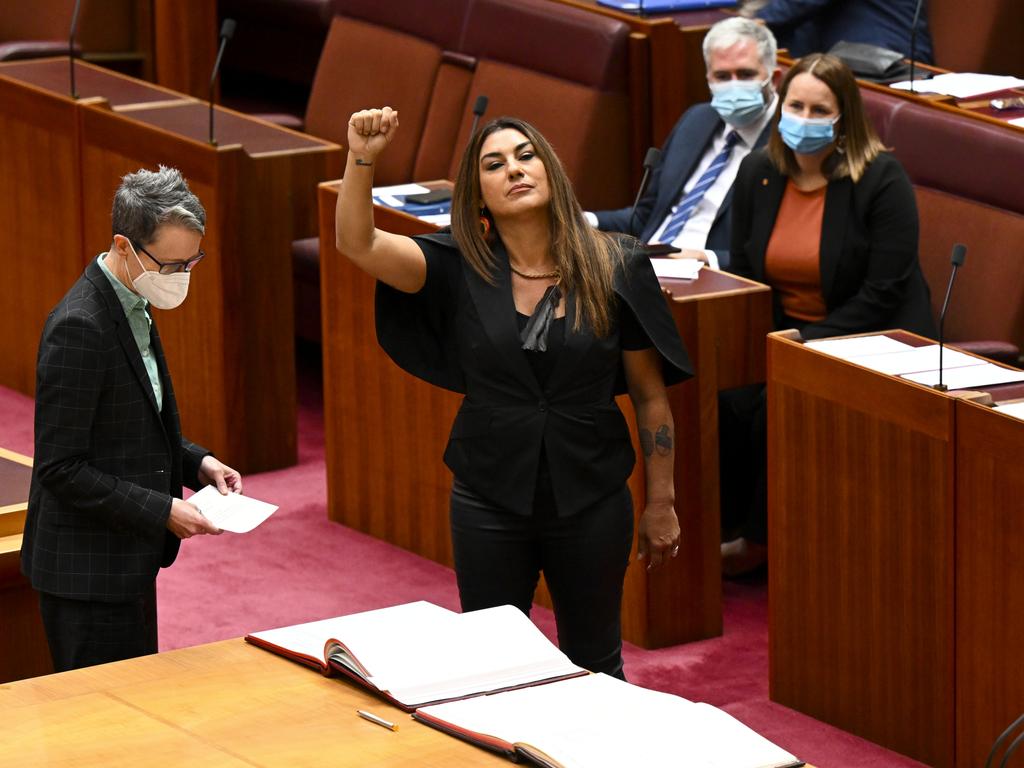Pauline Hanson slams voice to parliament as ‘Australia’s version of apartheid’
One Nation leader Pauline Hanson has blasted Prime Minister Anthony Albanese’s “Indigenous voice” proposal as “Australia’s version of apartheid”.
One Nation leader Pauline Hanson has blasted Prime Minister Anthony Albanese’s “Indigenous voice” proposal as “Australia’s version of apartheid”.
Speaking to a nearly empty Senate chamber on Wednesday, Ms Hanson delivered her most strident attack to date on what she dubbed the “racist” referendum proposal, while praising fellow Senator Jacinta Price, the lone Indigenous MP who opposes the advisory body.
The five-minute speech came a week after she dramatically stormed out of the Senate during the routine morning “acknowledgement of country”.
“The creation of a voice to parliament will not, as the Prime Minister would have us believe, be a unifying moment,” Ms Hanson said.
“I’ve already been contacted by elders on traditional lands who say they do not support the voice and had no say in the Uluru statement. This will be no different to the stolen generations apology. Let me remind you of the reason for this apology. We were told it was necessary for us to move forward together as a united nation. How has that worked out?”
Ms Hanson accused the PM of having “contempt for these dissenting voices, including Aboriginal voices”.
“His contempt for those who rightly and justly request details of the proposed voice, such as its powers, functions and costs, has also been very clear,” she said.
“He is not promoting unity at all. The Prime Minister is deliberately stoking division and stoking it on racial lines. As Senator Price noted in her landmark first speech in this chamber, ‘Many Indigenous Australians have not been consulted about the voice, and many have no clue what it’s about.’ This comment has come from an Aboriginal woman. The Prime Minister has dismissed her comments saying, ‘They don’t stack up.’ No. His comments do not stack up. That’s because the Prime Minister is listening only to the Aboriginal industry, whose gravy train relies on separating Australians by race and entrenching Indigenous disadvantage. I’ve been saying this for decades.”
The One Nation leader said there was nothing in the proposal that addresses “real disadvantage”.
“There is nothing in this proposal that will end the violence, poverty and failure of service delivery in Aboriginal and Torres Strait Islander communities,” she said.
“There is nothing in this proposal that indicates how much this entire exercise will cost Australian taxpayers. However, I feel compelled to note that the annual funding of the Aboriginal and Torres Strait Islander Commission in its final years was well north of a billion dollars. It’s almost certain a referendum alone will cost in excess of $120 million.”
Stream more on politics with Flash. 25+ news channels in 1 place. New to Flash? Try 1 month free. Offer ends 31 October, 2022 >

‘Australia’s version of apartheid’
She said a better solution would be to hold the referendum at the next election, saying there was “much in this proposal that is open-ended, ill-defined and fraught with peril”.
“The risk is very real that the sovereignty that all Australians have over their land and country will be handed to a racial minority,” she said.
She questioned why the voice had to be in the Constitution.
“What is the real ulterior motive? This can only be about power – creating a nation within a nation,” she said.
“This can only be about taking power from whitefellas and giving it to blackfellas. This is Australia’s version of apartheid. Are they prepared for the compensation or reparations which will be demanded when the High Court decides that ‘traditional ownership’ means ‘sovereign control’. Where will you stand, given that you acknowledge traditional ownership every day? Do you acknowledge that I, like millions of Australians, legally own my land and worked very hard for it? Do I have rights to my land, too? Can’t you acknowledge my connection to my land and my love for my country?”
Ms Hanson took aim at Indigenous Senator Lidia Thorpe, who last week slammed the One Nation leader as “ignorant and racist” for storming out during the acknowledgment.
Ms Thorpe held up her first in a black power sign as she branded the Queen a “coloniser” during her oath of allegiance in the chamber on Monday.
“I note Lidia Thorpe’s racist interjection in the past when she told me to go back to where I came from,” Mr Hanson said.
“She can rest assured that I did, indeed, go back to where I came from – back to Queensland, where I was born and where I raised my children, and where my parents and grandparents were born. There is nowhere else for me to go. Australia is my home. Australia is our home – Indigenous and non-Indigenous alike.”
She warned that despite Mr Albanese’s claim that the Indigenous voice would not have veto power over legislation, he could not speak for future governments “or say what legislation before parliament must be referred to the voice for consultation, who will be eligible to stand for election to the voice and who will be eligible to vote”.
Ms Hanson also raised the issue of the growing numbers of Australians identifying as Aboriginal, which some Indigenous leaders have warned may make it harder for the government to help disadvantaged people.
“We need a stronger definition of Aboriginality,” she said.
“From 2016 to 2021, the number of Australians identifying as Indigenous rose by 92,000 or 26 per cent, while our overall population increase, including immigration, was only 8 per cent. This is what we call ‘jumping on the bandwagon’.”
She concluded by slamming the voice proposal as full of “empty gestures and symbolism which make progressives feel good about themselves but otherwise achieve nothing”.
“It’s also reeking of the disgusting, patronising attitudes that privileged bureaucrats and lawmakers routinely adopt towards Indigenous Australians – proud members of a culture which has endured for tens of thousands of years,” she said.
“This is an attempt to rewrite the past, manipulate the present and destroy the future. Unlike both sides of this chamber, I have listened to Indigenous Australians and their elders. Stop using them as fodder for your own purposes.”

‘Hard right is calling the shots’
Her comments came after former Prime Minister Tony Abbott also criticised the government’s plan for a constitutional voice to parliament, saying it risks deeper separation in the country and weaker governance.
In an opinion piece in The Australian on Wednesday, Mr Abbott said while he was in favour of recognising Indigenous Australians in the Constitution, he would draw the line of support at any attempt to make a “race-based body part of our parliament and not if it means changing our system of government”.
His comments have copped criticism from serving government ministers, including Ed Husic, who chastised the Liberal Party on Wednesday.
“If this view is what the current crop of Coalition MPs is gravitating towards, it tells me two things – the hard right is calling the shots and the Coalition hasn’t learned anything from their loss,” he told ABC Radio.
Mr Abbott said a voice to parliament would “make race an element” in who can vote and stand for election and would also “unavoidably change” the way Australian government works.
“Because a particular group will have an unspecified say over unspecified topics with unspecified ramifications,” he wrote.
“Good on Anthony Albanese for wanting to do the right thing by Aboriginal people. But a voice to the parliament would not actually be power – unless it turns out to be much more than just an advisory body. If the body really is, in the Prime Minister’s words, to ‘end 121 years of commonwealth governments arrogantly believing they know enough to impose their own solutions on Aboriginal people’, it’s obviously going to have something approaching a veto over decisions the parliament might otherwise make.”
Mr Albanese and relevant ministers have remained elusive as to what the voice to parliament would look like.
There have been calls from independents, Greens, and the Coalition for the government to release more details about the voice before it goes to referendum next year.
Some critics of the voice, like Ms Price from the Country Liberal Party, say it would do more harm than good – a sentiment echoed by Mr Abbott.
“Everything about the proposed voice drips with entrenching separatism as an atonement for dispossession even though Indigenous people can never expect to achieve Australian outcomes without also embracing Australian standards,” Mr Abbott wrote.
“The last thing we should do is allow goodwill to cloud judgment and to be morally bullied into becoming a country that’s more divided and less well governed.”
Indigenous Minister Linda Burney has said the government will consult “extensively” on the voice before the referendum.
“We will consult, we will talk to people and answer the things that people are anxious about,” Ms Burney said on the weekend.
“But I can assure you the way in which we will move is carefully, collaboratively, and bringing people with us. That’s what’s important.”
— with NCA NewsWire






